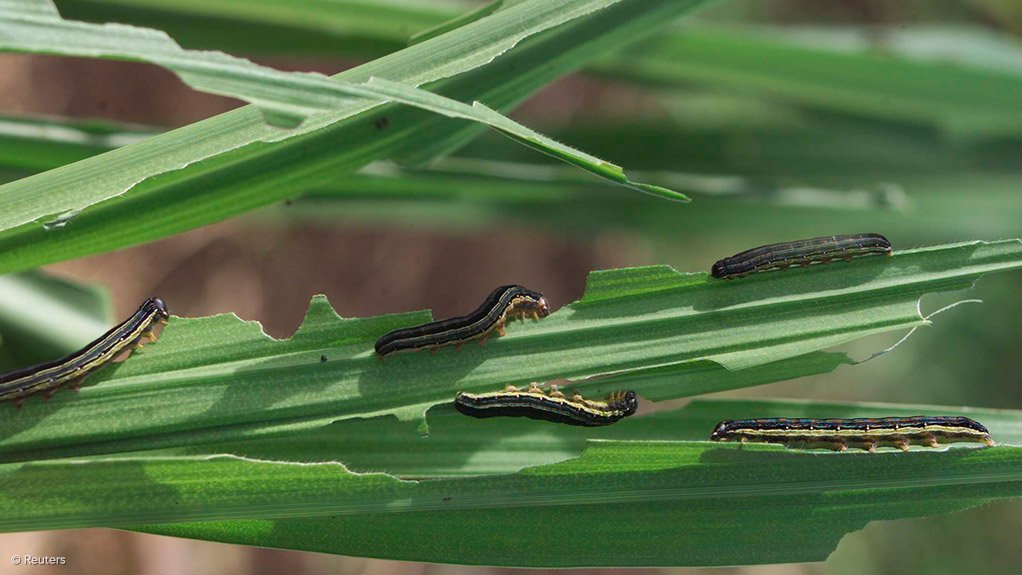/ MEDIA STATEMENT / The content on this page is not written by Polity.org.za, but is supplied by third parties. This content does not constitute news reporting by Polity.org.za.
The Department of Agriculture, Forestry and Fisheries (DAFF) today received a diagnostic report from the Agricultural Research Council, Plant Protection Research Institute (ARC PPRI) to confirm that the Fall Army Worm was positively identified from samples collected in the Limpopo Province. The samples were jointly collected by scientists from the ARC Grain Institute and the North West University. These were caterpillars that had to pupate and emerge as moths before a positive identification could be done.
Fall Army Worm (FAW) is a quarantine pest for South Africa which has a wide host range and can affect crops such as maize, sorghum, soybeans, groundnuts and potatoes. This pest is a good flyer and cannot be contained in a specific area. Damage reported in South Africa so far is mainly on yellow maize varieties and especially on sweetcorn as well as maize planted for seed production. Reports of caterpillar damage have been received mainly from the Limpopo and North West provinces.
The South African Emergency Plant Pest Response Plan is already in motion which deals with new pest detections in South Africa. The actions implemented depend on the pest, the extent of the spread and extent of the damage. Now that there is a positive identification, DAFF will continue with assessment of spread and damage, awareness actions to provide farmers with accurate technical information and control options. Pheromone traps will be imported into South Africa to determine the exact extent of the spread and the specific strain of FAW present in South Africa. Diagnostic support has been increased to deal the bulk of sample identification. DAFF is working closely with Provincial Departments of Agriculture and farmers to assess damage on farm level, to determine other hosts affected and to implement roadshows where farming communities are made aware of the pest.
As the FAW is a new pest to South Africa, no pesticide was previously registered to be used against it. A process of emergency registration of agricultural chemicals is initiated for urgent registration. Chemical suppliers are therefore encouraged to apply for emergency registration of agricultural chemicals to be used on maize and other host plants against Spodoptera frugiperda. An interim control program aimed to assist farmers with a guide for pesticide use as an emergency measure is communicated to various role players and it will be available in the DAFF website.
Currently, there are products (pesticides) already approved to control Lepidoptera pests in maize and other crops that may be damaged by this pest. The department made calls to all manufacture of pesticides and biological products to submit applications for emergency registration. The objectives are:
(1) To amend product labels to include the new pest (armyworm)
(2) To have new products registered which were not registered on crops affected, this are new products aimed to manage resistance
As from next week, the department will be approving various products where the manufactures have already submitted such applications. It must be noted that the products that have been identified to control the pest are already available in the market, and as such farmers should be able to access them.
In the interest of human safety and pest resistance management, the department encourages the use of registered products in terms of the fertilizer, Farm Feeds, Agricultural Remedies, and Stock Remedies Act, 1947 (Act No. 36 of 1947). The end users should work hand in hand with DAFF, pesticide manufacturers, distributors, Co-ops and consultants for technical advice.
DAFF has also initiated a plant pest action group which consists of members from several producers associations and industries which may be affected by this pest. The group will meet regularly and progressively determine the way forward to manage this pest.
The presence of the pest will be notified on the International Plant Protection Convention’s portal in terms of South Africa’s international pest reporting obligations. SADC member countries will also be notified and regional control measures will be discussed.
Crop producers are encouraged to report suspected detection of this pest to the Department. Please report to Jan Hendrik Venter at: 012 3196384, 0723488431 or janhendrikv@daff.gov.za. Please contact a chemical representative to advise with control options.
Issued by Department of Agriculture, Forestry and Fisheries
EMAIL THIS ARTICLE SAVE THIS ARTICLE ARTICLE ENQUIRY
To subscribe email subscriptions@creamermedia.co.za or click here
To advertise email advertising@creamermedia.co.za or click here











